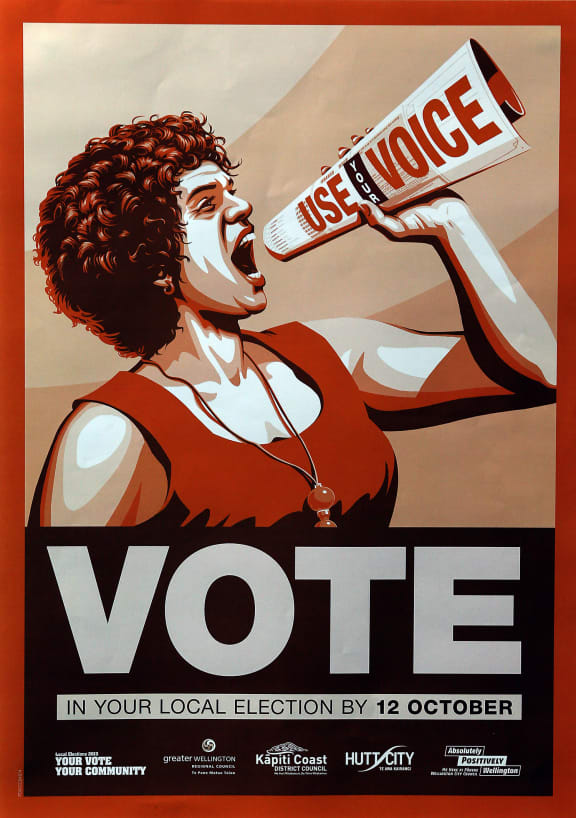Voters have until noon this Saturday to cast their votes in the local body elections.
But voter apathy and lacklustre campaigns are set to make the turnout for this round of elections the lowest in history.
Our reporter Steve Wilde has been travelling up and down the country, following the local campaigns for Radio New Zealand.
Here is his analysis of the low voter turnout.
I think the head of Local Government New Zealand, Lawrence Yule, summed that up quite nicely when I was talking to him - he says New Zealanders have simply lost their sense of civic duty.
And it really does show when you travel the country - and see those town hall meetings, where 70 or 80 people turn up - and this is in cities with populations of over 100,000 people.
These local body elections have simply failed to excite voters.
And it's hard to explain why.

Photo: RNZ
In Auckland where the issues are simply massive - with billions of dollars to be spent on housing and transport - these are issues which will not only affect Auckland but the entire country - the voter apathy is breathtaking.
Of the more than one million eligible voters - Auckland looks on track to pull in about 30% of those.
It's a major problem and I think it will have ramifications in the next three year term, where Local Government NZ president Lawrence Yule says he'll be demanding the Department of Internal affairs seriously look at the voting system and the way it's done.
He's calling for postal voting to be scrapped and is championing online voting - with a few polling booths - as the way forward.
He also says a shorter campaign period would help.
And that appears to be what voters and candidates want.
It would focus attention, and make the campaigns more dramatic and that may engage voters more.
As at Wednesday morning voter turnout looks be 2% down on last time - the lowest voter response in history.
As to the issues people are talking about:
Council debt and amalgamation appear to be a constant across most of the councils.
If you look at Wellington, and Dunedin and even Southland, Invercargill and Central Otago - those councils are all going to be dealing with the possibility of amalgamation in this next term.
Auckland has the major problem of housing and how to pay for it - some wildly opposing views from the candidates from John Minto's $200 million plan to build 20,000 council funded houses to purely private developer models.
The Housing Accord which the councils signed with the Government is now rolling out - but it's still not clear how successful that's going to be and that will form the major workload for the incoming mayor - along with of course the transport issues for the city.
Christchurch is of course interesting because of the fallout from the earthquakes. There is certainly no voter apathy there - but things are all but tied up, following the earthquakes and government intervention. It seems the only choice Christchurch voters have is which mayoral candidate is going to be the one who can get on with Gerry Brownlee and the Government.
Of course it's the make up of councillors around the table that will be interesting there and who they appoint as the new Council chief executive - that's going to be fascinating.
And then you have the purely regional issues - water fluoridation in Hamilton, the Ruataniwha Dam in Hawkes Bay, the convention centre in Queenstown, oil and gas exploration in Dunedin, the funding of the Hunderwasser Gallery in Whangarei, and Western Bay of Plenty, where the future town centre revamps are crucial.
The living wage for Auckland council workers has been an interesting sideline in that campaign.
To the more interesting mayoral races:
Wellington is clearly coming down to the wire. Celia Wade-Brown is in a classic local government election stoush with John Morrision. Who can call that race? I found it very interesting watching Celia Wade Brown defend her position in the debates I hosted and attended.
I'd also look to Christchurch - Lianne Dalziel, polls are putting her out as the favourite, but Paul Lonsdale has run a very good race there. And of course it's all about the quakes' aftermath - how well will the new mayor get on with the Government and some of those big ticket projects like the town hall - there could be a relook at the money being spent there.
Nelson is another one where it may come down to the wire. Aldo Miccio - the first time incumbent - he's a bit of a personality, he wants to hold the top job but he's getting competition from a current councilor and former deputy Mayor Rachel Reece. They are neck and neck.
Invercargill - another shoe-in for Tim Shadbolt - but more interestingly if he wins this election he'll be New Zealand's longest-ever serving mayor.
In Napier Barbara Arnott is standing down and Southland District Mayor Frana Cardno - one of the longest serving mayors in New Zealand - is also standing down, so new directions for both those places with new people in the top job after this Saturday.

